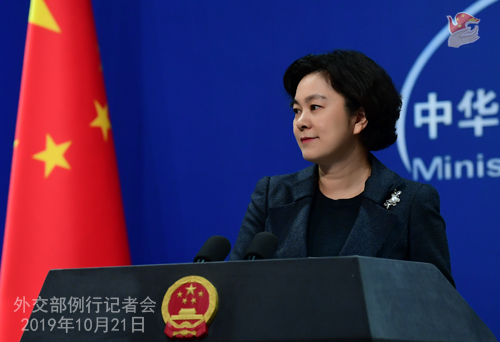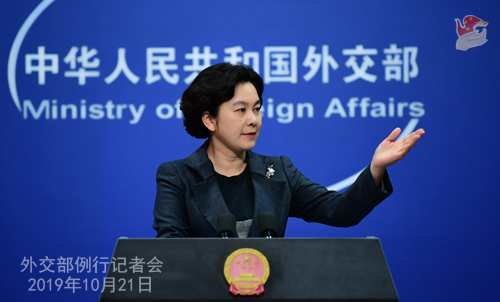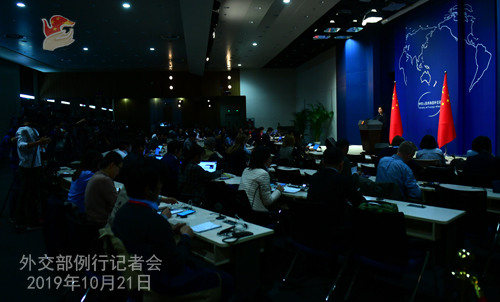| Foreign Ministry Spokesperson Hua Chunying's Regular Press Conference on October 21, 2019 |
| 2019-10-21 21:06 |
|
Q: First question, the US Ambassador to China said today that Washington has implemented so-called reciprocal measures, and he hoped China will ease restrictions on US diplomats meeting local officials in China. Can you comment on the statement and whether China will ease the restrictions? My second question, can you confirm or comment on Japan's statement today that one of its citizens has been detained in China on suspicion of spying? A: Regarding the first question, my colleague stated China's position on the US restrictions on Chinese diplomats' normal, work-related activities in the US. You said the American ambassador was restricted. I wonder where he said that, what exactly he said and what specific restrictions he faces in China? As I recall, Ambassador Cui Tiankai to the US said just a few days ago that the former American ambassador to China visited all Chinese provinces in three years' time, while Ambassador Cui hasn't visited all the states in the US during his term of six and half years. The Chinese side has a positive attitude on and provides assistance to American diplomats' normal, work-related activities in China. So I wonder if the American ambassador can make some clarifications on his remarks regarding when and what kind of restrictions he met with? On this issue, we hope the US side can face up to the facts, provide convenience for people-to-people exchange and normal work-related activities between our two countries rather than setting obstacles or, even worse, shifting blames. Regarding your second question, I'd refer you to the competent authority as I'm not aware of the specifics. But I'd like to underscore the fact that the treatment that the Chinese side gives to foreign citizens suspected of violating Chinese laws is entirely lawful. Regarding this case, we will provide necessary assistance in pursuant to the Agreement on Consular Relations between Japan and China for the Japanese side to fulfill its consular duties. Q: We have seen that the demonstrations in Catalonia, Spain and London, the United Kingdom are becoming more and more like those in Hong Kong, especially concerning the violent offenses like arson, blocking airports and smashing shops. The violent demonstrators there claimed that they copied the "Hong Kong experience", and they wanted to make the places "another Hong Kong". However, Western politicians and media talked very few about this and some of them even clammed up. They believe those cases in Hong Kong are "democracy and freedom" while those in the West are "violence and rioting". I wonder what's your comment? A: We have taken note of the developments in Catalonia, Spain and London, the United Kingdom, as well as the Western countries' attitude on these cases. Relevant media reports and comments have drawn much attention from the Chinese people, but we believe these are internal affairs of Spain and the UK that should be properly handled according to law. However, as you said and the Chinese people have noticed, some Western politicians and media have apparently adopted different attitudes towards illegal, violent offenses that took place in different places. This tells us at least two things. First, democracy and human rights are only a hypocritical cover for Western interference in Hong Kong affairs. Second, there can only be one single standard and one single attitude towards violent offenses. In the end, double standards and connivance will hurt oneself as well as others. Judging from the relevant developments in recent days and the performance of some Western politicians, more and more people have come to realize that "human rights", "democracy" and "beautiful sights" preached by some Western politicians are just illusory as a mirage in the desert or the Sirens' song on the sea. Those who cannot distinguish right from wrong and stand firm will only end up getting lost and destructed. Q: On October 17, David Stilwell, US Assistant Secretary of State for the Bureau of East Asian and Pacific Affairs, said in his speech at the Wilson Center that China and the US are in a strategic competition, that the US must change the way it deals with China, and that ideologies do not matter that much now. He also wantonly criticized China's social system. I wonder if you have any comment? A: I noted the relevant reports. Mr. Stilwell's speech exposed the serious ideological prejudice of some people in the US against China as well as their deep-seated mindset of hegemony and double standards. In his speech he wantonly criticized China's social system, embittered by our country's pursuit of national rejuvenation. In fact, the Chinese people have the best say in whether our system is good or not. Our practice in the past years has spoken volume. We just celebrated the 70th anniversary of the founding of New China. The international community all spoke highly of the tremendous progress China made in the past seven decades and its important contributions to world peace and development. Altogether leaders of 178countries and heads of 36 international and regional organizations sent congratulations through various means. History and practice have shown that the path of socialism with Chinese characteristics is a right path consistent with China's national conditions and needs and is hence endorsed and supported by the Chinese people. Polls by multiple foreign institutions show that China enjoys the highest domestic support rate regarding its social system and development path among all the countries surveyed. Since it is a right and successful path, why should we change course? Since it enjoys the people's support, why should we give it up? China and the US differ from each other in history, culture, social system, development path and national conditions. Neither side could change the other. The US idea of transforming others according to its own wish is wrong, and it will never work. China will not be manipulated. We will steadfastly follow the path and direction we have chosen. It is never China's intention to change the US. Likewise, the US should not dream of changing China. It should learn to respect the legitimate right to development of China and other countries with an inclusive and equal attitude. If a country is always fantasizing about altering others, its hopes will surely end up being smashed glasses. Only by learning peaceful co-existence and win-win cooperation can all share a galaxy of brilliant stars. There has indeed been competition and disagreement between China and the US. However, I'd like to stress that we must not let our mind be controlled by prejudice and apprehension, or let our relationship be defined by conflict and confrontation. What we need is to have those differences properly handled through equal-footed consultation, and keep working to expand common ground while setting aside differences. We hope the US will discard the obsolete Cold-War mentality, return to reason, view and handle relations with China correctly and work to consolidate rather than undermine mutual trust and cooperation.
Q: Vice President Wang Qishan will attend the enthronement ceremony for the new Japanese emperor tomorrow. Can you tell us your expectations for this visit? A: As the special envoy of President Xi Jinping, Vice President Wang Qishan has set off to attend the enthronement ceremony of Emperor Naruhito in Japan. China and Japan are important, close neighbors linked by the sea. During the G20 Osaka Summit in June this year, President Xi met with Prime Minister Abe and reached important consensus with him on building a bilateral relationship in keeping with the demand of a new era. Through this visit, China will work with Japan to maintain the momentum of high-level exchange, step up practical exchange and cooperation in various fields, and move forward the bilateral relations on the right track. Q: First question, Iran says that a Chinese special envoy is visiting Tehran tomorrow. Do you have any information on that? Second question, is President Xi Jinping definitely going to the APEC conference in Chile? A: On your first question, I have nothing specific for you at the moment. China and the Gulf countries keep friendly and close exchanges. Regarding your second question, China attaches high importance to the 27th APEC Economic Leaders' Meeting to be held in Chile. APEC is an important Asia-Pacific mechanism for economic cooperation. China stands ready to work in concert with other sides to ensure fruitful outcomes of the summit and to deepen APEC cooperation for more tangible results. China supports Chile in successfully hosting the APEC Economic Leaders' Meeting this year. As to China's attendance, we will make an official announcement in due course. Q: Further to the Japanese national detained in China, has the Chinese side clarified the cause of the detention to the Japanese side? Some in Japan say this incident might dampen the momentum for improvement of China-Japan relations, I wonder what's your comment? A: As I said earlier, you will need to ask the competent department for specifics on the case. I can assure you, China is a country with rule of law. The relevant authority does not detain foreign nationals without due cause. As I just stated, the Chinese side handles foreign nationals who have violated Chinese laws in accordance with law. On this case specifically, we will facilitate consular access for Japanese officials based on the Agreement on Consular Relations between Japan and China. We hope the Japanese side will remind its citizens to respect China's laws and regulations and to not engage in illegal and criminal activities in China. Some said this case will affect the amelioration of bilateral relations. Well, I think such interpretation or speculation is surely an exaggeration. There is no need to link an isolated case with overall relations, which is a completely separate matter. As I said, Vice President Wang Qishan will attend the enthronement ceremony for Emperor Naruhito tomorrow. We stand ready to work with Japan to make sure bilateral relations could advance along the right track. Q: According to media reports, Indonesia's president-elect Joko Widodo was officially sworn in on October 20. President Xi Jinping's special envoy and Vice President Wang Qishan attended the inauguration ceremony. Could you share more information? What are China's expectations for cooperation with Indonesia's new government? A: At the invitation of the Indonesian government, from October 18 to 21, President Xi Jinping's special envoy and Vice President Wang Qishan traveled to Jakarta for the inauguration ceremony for President Joko Widodo's second term and paid a friendly visit to the country. Vice President Wang met with President Joko Widodo and Vice President Ma'ruf Amin respectively. Vice President Wang conveyed President Xi Jinping's warm congratulations, cordial greetings and best wishes to President Joko Widodo on his succession. He said that China and Indonesia are good neighbors, good friends and good partners. Both are major developing countries in Asia and the world. The significance of China-Indonesia relations transcends the bilateral scope. China appreciates President Joko Widodo's commitment to promoting the China-Indonesia comprehensive strategic partnership and to seeking synergies between the BRI and Indonesia's development strategies. With the care and support of the two heads of state, the Jakarta-Bandung high speed rail project made smooth progress, which has become an example of infrastructure cooperation between the two countries. China and Indonesia, both belonging to the Oriental civilization, boast distinctive historical and cultural heritages. Both are developing countries, emerging economies and important members of the G20. As such, the two sides are well-positioned geographically, historically and culturally to enhance cooperative relations. There is also a practical need for mutual learning and win-win cooperation. We believe that under the leadership of President Joko Widodo, Indonesia will achieve greater progress in the next five years. We also stand ready to work with Indonesia to bring bilateral relations and practical cooperation in various sectors to a new level.
|
 |
|


